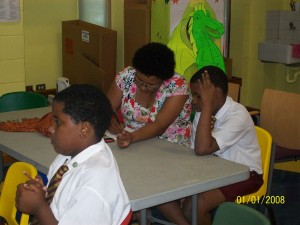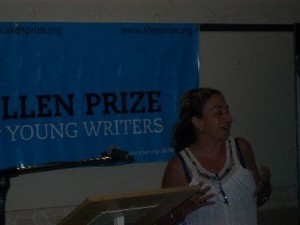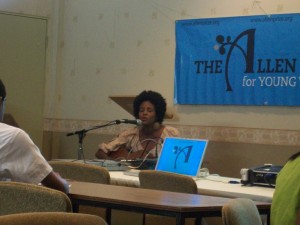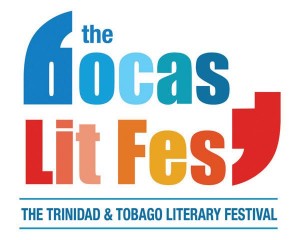Posted: October 16th, 2011 | Author: lise | Filed under: Books | Tags: Alice Walker, artists, Brown Girl in the Ring, Caribbean fantasy, Caribbean sci-fi, Midnight Robber, Nalo Hopkinson, Race, role models, speculative fiction, Trinidad & Tobago, UWI, WI Literature Conference, writing | 1 Comment »
Last week I picked up the Alice Walker collection of essays In Search of Our Mothers’ Gardens and reread the very first essay, “Saving the life that is your own: The importance of models in the artist’s life”. I’ve read this essay before, many times, in fact, over the years since I first got the book back when my teenager was a little baby. The essay’s theme, that artists need to have templates to follow in order to live their lives, is one that I have always believed in. The templates are knowledge of the very existence of other artists like them. The timing of my rereading of the essay proved prescient, as this weekend I was fortunate to meet a woman writer whom I have admired for years, Nalo Hopkinson.

Nalo Hopkinson. Photo from http://nalohopkinson.com/
A brilliant writer, Nalo is one of the few Caribbean sci-fi/fantasy writers who have been internationally published. Her first books Brown Girl in the Ring and Midnight Robber are bonafide sci-fi classics. She writes brave feminist fiction; it is outstanding not simply because of its themes and Caribbean characters of colour (and the fact that in speculative fiction black writers are few and far between) but also because she’s a fine writer with a gift for lush, descriptive writing.
I treasured the time I spent listening to her and in the writing workshop she gave at the 30th WI Literature Conference, which took place at UWI, St Augustine, this weekend. Here is a writer who more or less forged her way in the publishing world without compromising her vision or her voice. This is a model I would be happy to emulate.
Posted: September 3rd, 2011 | Author: lise | Filed under: Books, Column | Tags: Caribbean, Caribbean Beat, Caribbean writing, How to Escape from a Leper Colony, interviews, OCM Bocas Prize, Tiphanie Yanique, Trinidad Noir, USVI, writing | No Comments »
The latest issue of Caribbean Beat magazine features an interview I did with USVI writer Tiphanie Yanique. You can read it here. I’ve already written a bit about Tiphanie on this blog here, but it’s worth repeating that she’s a gifted writer and I’ve been privileged to do a little book tour with her in NY a few years ago. I know she’s going to be an even bigger name in Caribbean literature as the years roll on and I’m pleased to have my name next to hers in Trinidad Noir, to which she contributed a story that appears in another version in her prize-winning book How to Escape from a Leper Colony. Write on, Tiphanie!
Posted: July 12th, 2011 | Author: lise | Filed under: Column | Tags: crime, Lisa Allen-Agostini, literature, Noir, short fiction, sx salon, The Gun, Trinidad & Tobago, Trinidad and Tobago, words, writing | No Comments »
The internet publication sx salon (produced by the Small Axe people) features a new story from me this month. The story is a noir-ish short called The Gun.
I have to say thanks to my writing workshop group–Sharon, Barbara, Alake, Rhoda and Monique–for their support in the editing and publication of the story. Could not have done it without them. A real tribute to the power of community. 🙂
The story is up here, but do also check out the rest of the magazine. Other pieces include reviews of books by Christian Campbell, Anton Nimblette and Geoffrey Philp, and the issue is a tribute to Peepal Tree Press, which celebrates its 25th anniversary this year.
Posted: June 1st, 2011 | Author: lise | Filed under: Books, Column, The Allen Prize | Tags: African-American, black, Caribbean, Harlequin, Kimani, Mills and Boon, Race, romance, Roslyn Carrington, Simona Taylor, Trinidad & Tobago, Trinidad and Tobago, writing | 3 Comments »

The cover of Intimate Exposure by Simona Taylor
Possibly because my mom was an avid Mills and Boon reader, I was weaned on romance novels. I loved these books for their ability to translate dreams and fantasies about love and happiness into 200-page packages in which the girl always got her man AND the amazing career she wanted, a perfect house and babies, to boot. A bonus was the settings–I learned about Australia, Canada, England, Scotland, Ireland, Kenya, Fiji, the Seychelles, all through the writings of such romance stars as Barbara Cartland, Penny Jordan and Margaret Way. Later, I learned about the US through the Desire brand and Harlequin Romances. All the characters were white and the men were rich and the women mostly middle class. Somewhere along the line I discovered that the characters didn’t have to be white; there were black–even Caribbean–romances, too. Trinidadian author Valerie Belgrave has written some, including one called Tigress, which I planned, once, to write a thesis on.
Another Trinidadian author, Roslyn Carrington, has made a career writing black romances under the pen name Simona Taylor. (Full disclosure: Roslyn has been a speaker and a judge for various aspects of my NGO, The Allen Prize for Young Writers.) She gave me a copy of her latest, Intimate Exposure (Kimani Press, 2011), a couple of weeks ago and I read it hungrily. I found to my delighted surprise that not only was her story intriguing and captivating like a good romance novel ought to be, I liked her characters as well.
Romance novels rely on a formula that is seldom, if ever, deviated from: the male lead is very rich, charming and a chick magnet, while the female lead is unspeakably beautiful but for some reason in an awkward spot. They meet and he immediately falls in love with her but tries to deny it (and she does the same for him). After triumphing over some betrayal, they live happily ever after. (Think Pretty Woman, except that Julia Roberts’ character is a secretary, not a whore.) That holds true for Intimate Exposure, but with some surprising twists–which I won’t give away because I don’t want to spoil them for you.
What most impressed me was the writing of the characters as feminist. The woman enjoys sex thoroughly (all the time, not just with this magical man in the book) and has an actual career in which her intelligence and education–not her great fashion sense–are paramount. She rescues herself from the betrayal, albeit with a push from the male lead–hey, it’s still a romance novel, and some things are inviolate here, including the man’s role as leader. She is, in short, a three-dimensional, smart, self-motivated woman. The male lead is allowed to cry and show weakness, and while he abets her in her struggle, he’s not the one who “saves” her. She saves herself.
The writing is tight and carries the reader along nicely, and there is the requisite stop in an exotic, pastoral destination–in this case the Caribbean island of Martinique; and the sex scenes are spicy and credibly written. In short, it provides all that a romance novel needs to be an entertaining escapist read, and more.
Posted: May 9th, 2011 | Author: lise | Filed under: Books | Tags: Caribbean, Caribbean Beat, Caryl Phillips, Lisa Allen-Agostini, literature, reading, St Kitts, Trinidad & Tobago, Trinidad and Tobago, words, writing | No Comments »
When I first started buying my own books, one of the first I picked up was a screenplay of Caryl Phillips’ Playing Away. The Kittitian-British writer has always had a special place in my heart because of that early memory and it was a pleasure and a privilege to interview him for Caribbean Beat Magazine last year when he was here during the Trinidad and Tobago Film Festival.
Many months later, here’s the story in Caribbean Beat. Hope you enjoy it.
Posted: May 2nd, 2011 | Author: lise | Filed under: Column, Poetry | Tags: Bocas Lit Fest, Christian Campbell, jazz, Lisa Allen-Agostini, Merle Collins, poetry, reading, Trinidad & Tobago, Trinidad and Tobago, writing | 2 Comments »
I’m posting here three poems. The first is a poem I wrote some years ago after my mom died, and which I read at the Bocas Lit Fest Poetry Lime Friday night; the other two are poems that came out of the Bocas poetry writing workshop I did. (Check the previous blog posting for details on that). I’m also putting up, for the workshop poems, the prompts that comprise the material that went into the poems.
Once
(For Dolsie)
Frail as hope
her wasted body
smells of soap
and soured dreams.
Once she was
much more than this.
Once she kissed
our smooth young faces.
She held us hard
against the world
outside her yard,
kept us safe.
Once she loved.
Once she moved.
Merle Collins, who led the workshop on Saturday with Christian Campbell, had the participants write for a minute after being given a prompt, and then we had to take those writings and shape them into a poem. These were my responses to the prompts and the poem that came from them. (It’s not very good, I warn you!)
Stew–stew in your own juices watching that ass slip slide hiccup down the hall oh lord will I never stop stop stop stutter to a halt
Friday–payday just got paid money in my pocket hey hey* (*you recognise this song?) but that is not me hungry when is my friday coming
Mango–sweet and slippery flesh sliding on lips nature is a boss fragrant flesh a gift thank you Jesus his face in every mango
Soft–but soft what light through yonder window breaks the window break? no yuh ass is shakespeare yuh ent ha no culcha or wha
Islands–her eyes were islands drowned in milk open only to what was inside her drowned
Drunk–like his blood eaten like his body consumed by the world that scorned him
Sky–open Irish frizzy hair delight bright smile heart-shaped face shape of her heart
Empty–Fennec on my lap warming my empty womb the son I will never have he answers when I call with a polite mew to say yes? you called?
Sea–me here in you so big and I so small and never could swim too good splash but not hard softer, a lapping more a lapping
From which I constructed:
You sea
me there in you
so big
and I, so small
and learning to
swim through
the softly lapping
waves of your hipsway
watching that
ass slip slide
hiccup down
the hall
slippery like
a mango
flesh a fragrant gift
but you
open to only
the islands of
her eyes
what is inside her
and me stroking
the kitten on my lap who
warms my empty womb
the son I will
never have
when I call him
he answers
with a polite
questioning
mew
I am become
the cat’s mother
she
Finally, Christian Campbell’s exercise was to use mimicry–like jazz singers scatting, like a soucouyant taking the shape of an old woman–to shape our poems.
I chose to mimic the form of a radio death announcement.
We have been asked
to announce the following death:
Respect, of women
and boundaries,
who dies on every street in town
every day.
The funeral of the late respect
will be held at noon
today
at the rape of your daughter.
No flowers, by request.
Posted: May 2nd, 2011 | Author: lise | Filed under: Column, Poetry | Tags: Barbara Lalla, Bocas Lit Fest, Christian Campbell, David Chariandy, Derek Wacott, Eddie Baugh, Edwidge Danticat, fiction, Lisa Allen-Agostini, literary festival, OCM Bocas Prize, poet, reading, Richmond Street Boys', Tiphanie Yanique, Trinidad & Tobago, Trinidad and Tobago, workshop, writing | 5 Comments »
If the Bocas Lit Fest (Trinidad and Tobago Literary Festival) had been held in another country, right now I would be packing, looking for my earrings on the floor behind the sideboard in my hotel room, clearing my non-existent room service charges and being driven to the airport in a shuttle or by a member of the organising committee. As it was, Bocas took place in my country and I just had to get into my car and drive home last night. The feeling at the ending of a great event is the same, though. Bocas left me replete, yet hungry for more.
It ran from Thursday April 28-Sunday May 1. Thursday’s highlight for me was my leading a creative writing workshop for 9-11-year-olds at the National Library in Port-of-Spain, where all the Bocas main events took place. There were 20 boys present, all from Richmond Street Boys’ Standard Three, and their teacher Mr Hercules. I did a quick talk about the basics–every story has a beginning, middle and end, and what is conflict and how it’s used–and then set them on a free writing exercise. I was honoured to be the scribe for a visually impaired boy, Kishon, as he told a wonderfully creative story about a boy reading a book about a wilderness explorer who gets savaged by a wild lion.

Another Thursday highlight was moderating a reading by two talented authors, Prof Barbara Lalla, and Prof David Chariandy. Prof Lalla is the author of two novels, and she read from her most recent, Cascade. I’ve read it, and it was as puzzling and beautiful as an impressionist painting. Up close it was hard to see the pattern in places, but once I was done and stepped back a bit it was gorgeous, a detailed, breathtaking vision of aging and friendship. Prof Chariandy’s debut book Soucouyant is a shortish novel that has won many plaudits in Canada, where he’s from, and I found it spare and gut wrenching. Having watched my own mother fall to dementia, the main theme of the book, I saw many things in the story that were painfully familiar.
Friday night I read in the Poetry Lime. It was originally supposed to be a poetry crawl, going from bar to bar in Woodbrook, a wonderful entertainment zone in Port-of-Spain, but was changed at the last minute to a lime at the Reader’s Bookshop in St James. While I would have been happy to tramp up Ariapita Ave drinking and reading increasingly slurred poetry, perhaps this worked out better–especially as I had to drive home! I read four poems, three tiny ones on love, and one short one on my mother’s experience with dementia. (I’ll post that poem separately.) It was an excellent, if packed reading. Some of the poets taking part were Phillip Nanton, Lorna Goodison, Tanya Shirley, Mark McWatt, Jane Bryce, Christian Campbell and Merle Collins. I was extremely flattered to have been invited to read in such distinguished company!

Jamaican author Marlon James takes in the poetry at the Bocas Lit Fest Poetry LIme
Saturday I took part in a poetry workshop with Christian Campbell and Merle Collins. The theme was mimicry and improvisation; participants had to use random prompt words given by Merle to write as much as they could, and then combine those slivers into a whole that, hopefully, would make sense. Christian made us think up a pattern to mimic and write a piece using that structure. It could have been anything. I chose the form of a radio death announcement. (I’ll post those poems separately, too.)
Sunday I was exhausted and so overstimulated I felt I had bees under my skin. I was constantly on the verge of tears and I couldn’t sit still. Thankfully, I had only a couple things planned and I could–and did–spend the day drifting around getting in people’s way after I finished taking part in a workshop on getting published. Now, since I’ve already been published one might say I shouldn’t have gone. But I nevertheless enjoyed the workshop and I thought the facilitators, Margaret Busby (founder of Allison and Busby), Jeremy Poynting (of Peepal Tree Press) and Ken Jaikaransingh (of Lexicon Books), did a terrific job of explaining the process. They gave tips to writers–including on finding an agent, looking for the right publisher, and formatting work for submission.
Oh! and Sunday too was readings from the winning OCM Bocas Prize books, Edwidge Danticat’s Creating Dangerously, Tiphanie Yanique’s How to Escape from a Leper Colony, and Derek Walcott’s White Egrets. Tiphanie, who was a contributor to Trinidad Noir and with whom I did a short book tour in NY in 2009, reads beautifully. Her story was about a convict who had been wrongly convicted of a crime he did commit. You’ll have to read the story to see what I mean! Prof Eddie Baugh, a Jamaican scholar and poet who I absolutely adore, read from Walcott’s poetry. His reading of a piece dedicated to Lorna Goodison made me shiver.

With Prof Eddie Baugh at a reception hosted by the French Embassy at the close of the Bocas Lit Fest
As always at the end of a really exciting and connected literary event I’m exhausted and sad but also invigorated and hopeful because of all the interesting people I’ve met, all I’ve learned and heard, all the books I’ve bought. I got poet Tanya Shirley’s collection She Who Sleeps with Bones, How to Escape from a Leper Colony, ARC Magazine’s second edition, and Earl Lovelace’s Is Just a Movie. Gobbled up Tanya’s book already and want to start on Tiphanie’s any moment now, once I’ve done some of the work I’ve neglected for the past few days!
I’ve put up a zillion photos from the weekend on my FB author page. Check them out and see if you can pick out the world famous Caribbean writers who were there!
Posted: April 10th, 2011 | Author: lise | Filed under: The Allen Prize | Tags: education, Lisa Allen-Agostini, literature, motivational speaking, seminar, The Allen Prize, training, Trinidad & Tobago, Trinidad and Tobago, words, writing, young people, young writers | No Comments »
I’m tired but happy today because The Allen Prize for Young Writers’ Term II Seminar was held yesterday and it was a success. Tired=lots of planning work and running around, then hosting and stage managing yesterday with the help of lots of people–my brother Dennis, my daughters, Rhoda, Brian. Happy because (although our preregistration drive netted us more than 50 students the actual turnout was, once again, lower than expected) we had a small but keen audience.

Part of the audience.
The speakers were marvelous. Nicholas Laughlin talked about the possibilities of creative non-fiction.

Nicholas Laughlin at The Allen Prize Term II Seminar 2011
Monique Roffey spoke about her life as a writer, starting as a wall-scrawling toddler, up to her short listing for the Orange Prize in 2011.

Monique Roffey at The Allen Prize Term II Seminar 2011
And Muhammad Muwakil performed his spoken word magic before giving a talk on writing.

Muhammad Muwakil at The Allen Prize Term II Seminar 2011
Gillian Moor was our guest performer.

Gillian Moor at The Allen Prize Term II Seminar 2011
It was an exciting morning. Now on to the Awards Ceremony in May, and the next seminar–in Tobago!–in June.
Posted: March 23rd, 2011 | Author: lise | Filed under: Column | Tags: Akashic Noir, Bocas Lit Fest, books, Calabash, journalism, Lisa Allen-Agostini, literature, Miami Book Fair, reading, Trinidad & Tobago, Trinidad and Tobago, workshops, writing | 2 Comments »
(My apologies for the somewhat lame pun on the movie title Enter the Dragon, as the Bocas Lit Fest, which is the subject of this post, is named after the Dragon’s Mouth, a narrow channel through which ships pass to sail to Port-of-Spain.)

I rather like book fairs and literary festivals. The first one I ever went to was Calabash, the now-defunct Caribbean literary festival held in Treasure Beach, Jamaica. I went in 2006 and there talked my way into the good graces of my first publisher, Johnny Temple of Akashic Books. He was innocently walking the idyllic grounds of Jake’s, the hotel which hosted Calabash for its ten years of existence, when I pounced on him and thrust upon him copies of the manuscripts I was flogging at the time. He took it in stride but I never thought I’d hear from him again, as all my other interactions with publishers and agents had gone poorly before. To my complete surprise he actually read them and emailed me… we met up eventually and Trinidad Noir was born.
So you can see why I would have a soft spot for literary festivals. What about book fairs, though?
My first major book fair was the Miami Book Fair International, an annual emporium of literary delights sprawling across the campus of Miami Dade College in Florida. It’s staged annually by a board led by that Florida literary powerhouse Mitch Kaplan, who owns the delicious Books & Books chain of bookstores in Coral Gables and the Cayman Islands, among other locations. “Book fair” is a kind of misnomer because the eight-day event includes not just book sales in a street fair but workshops, seminars, readings and parties.

Trinidad Noir contributor Elizabeth Nunez reading her story at the Miami Book Fair International, 2009
Trinidad Noir was featured in one session in 2009 and, apart from getting to read at that event and sell and sign books, I went to a couple of great parties tagging on the coattails of Johnny and his co-publisher Johanna Ingalls. From what I remember of the parties, they were great. (Don’t tell my kids I said that.)

Lisa Allen-Agostini with Mitchell Kaplan at the Miami Book Fair International wrap party, South Beach, 2009
All of that was a very long aside to say that Trinidad and Tobago’s first literary festival had its press launch on Tuesday at the National Library. The Library will host most of the events in the festival, and I can’t wait to prowl through what I imagine will be stalls and stalls of tasty books with even tastier discounts, listen to readings and generally schmooze with authors and other bibliophiles. The schedule looks pretty great, so much so that it’s impossible for me to pick out what I’m most looking forward to. Is it the Lovelace reading? Or perhaps it’s the prose fiction session with Marlon James and Mark McWatt? Maybe it’s the poetry vibesing with Christian Campbell and Merle Collins? Or is it the children’s sessions scattered generously throughout the four days of the festival? So many yummy treats. One thing is sure: don’t call me between April 28-May 1… I’ll be very busy at Bocas.
Posted: March 22nd, 2011 | Author: lise | Filed under: Column | Tags: Akashic Noir, interview, Lisa Allen-Agostini, literature, Noir, parenting, poetry, Trinidad & Tobago, video, writing | No Comments »
Was talking to a researcher today and recalled this video. Thought I’d post it again for those who missed it the first time. It’s a pretty wide-ranging interview–books, poetry, parenting and Facebook…
indigroove interview with Lisa Allen-Agostini












